Amid the usual pop star flash, a more inclusive and politically charged Latin Grammys
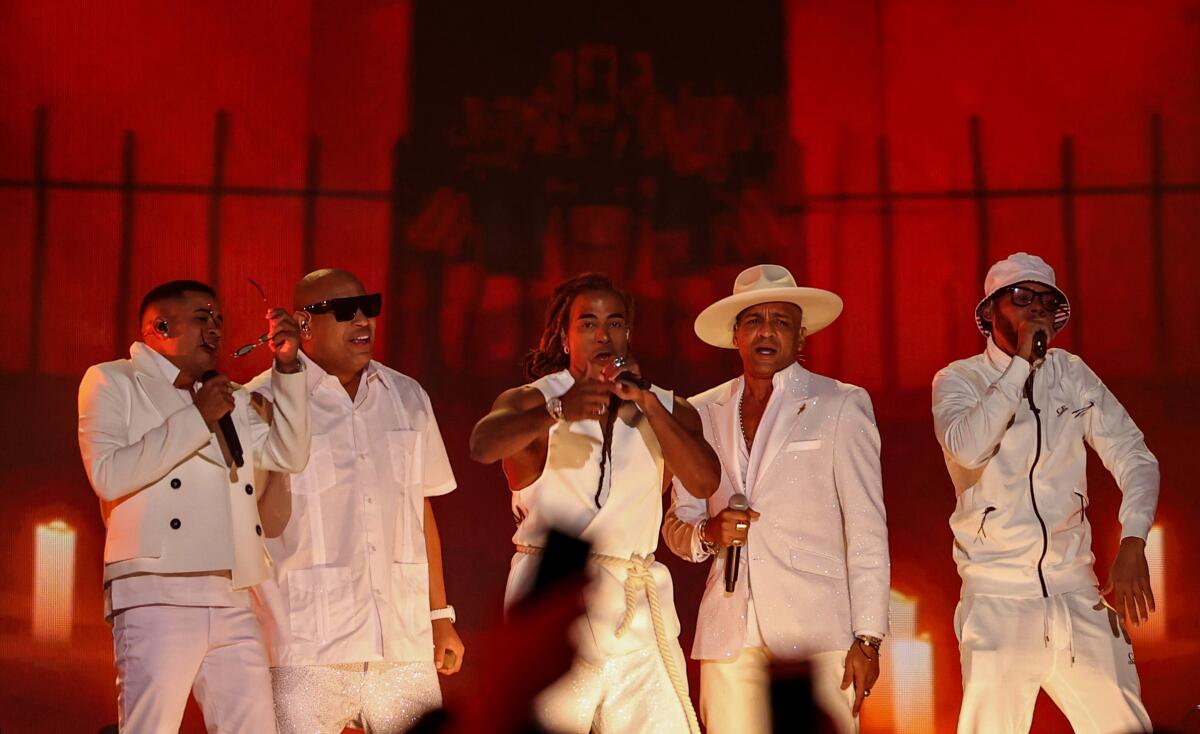
Inside a maximum security prison in Pinar del Río, Cuba, a rapper named Maykel “Osorbo” Castillo Pérez is currently on hunger strike. He has been jailed since May 2021, after he co-wrote and recorded the song “Patria y Vida” with exiled Cuban artists Gente de Zona, Yotuel, Descemer Bueno and Eliecer “el Funky” Márquez Duany.
This summer, thousands of Cubans took to the streets chanting those words, which mean “homeland and life” — an inversion of the late President Fidel Castro’s slogan “homeland or death” — in protest of power outages, food shortages and subpar healthcare amid the ongoing pandemic. Osorbo was beaten by Cuban police and charged with “resistance” and “contempt” against the government for releasing the incendiary song.
On Thursday night, “Patria y Vida” was named song of the year at the 22nd Latin Grammy Awards at the MGM Grand Garden Arena in Las Vegas. In a rare show of Latin Recording Academy-endorsed political protest, the Cuban collective, sans Osorbo, performed a sobering rendition of “Patria y Vida” — calling for a freer society, not just for Cubans, but for all.
So went the resounding moral of the story of this year’s Latin Grammys: If there was ever a time for international solidarity, it is now.
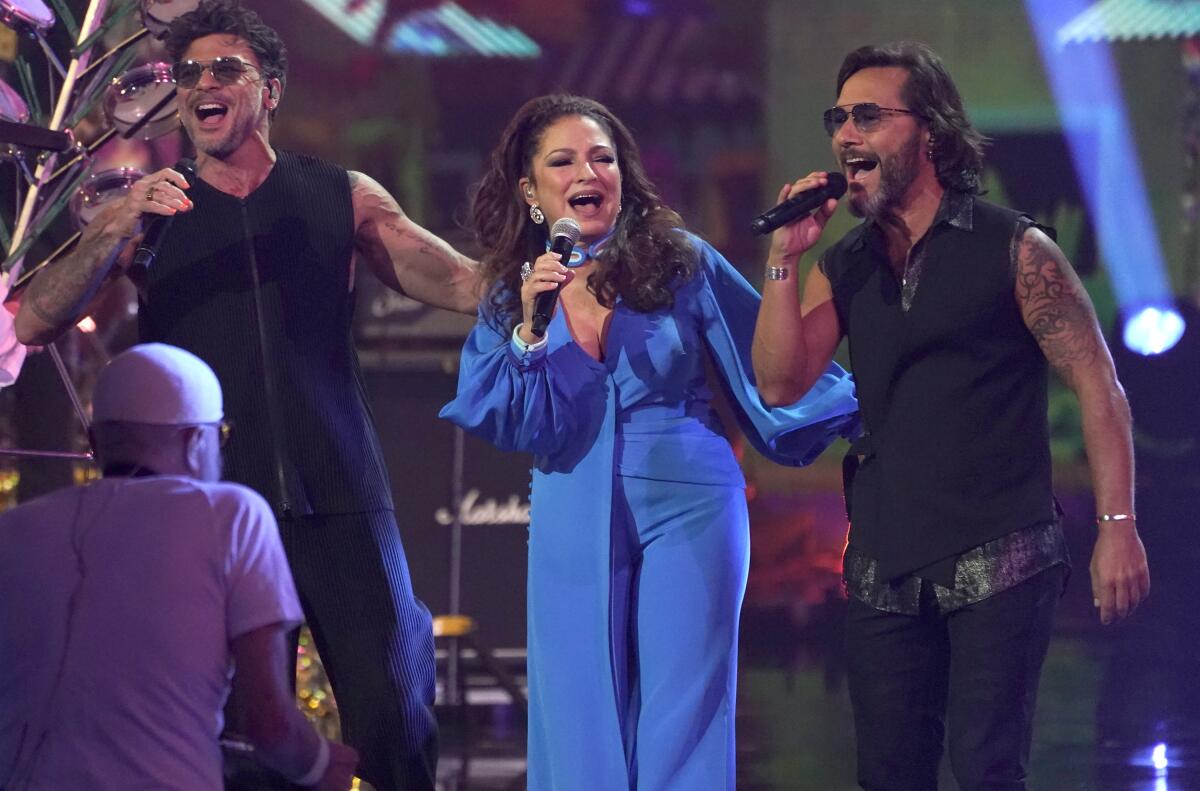
Colombian pop artist Camilo was the night’s big winner, capturing four out of the 10 awards for which he was nominated: pop vocal album, pop song, tropical song and urban fusion/performance. Spanish singer-rapper C. Tangana won three Latin Grammys, in the categories of engineered album, alternative song and pop/rock song.
After years of criticism about the dearth of Black nominees and a bias against rappers, the Latin Recording Academy was ripe for change. In May, Gabriel Abaroa, who served as the Academy’s chief executive office since 2003, was succeeded by Chief Operating Officer Manuel Abud. “I think it’s the perfect time for some new ideas and some new approaches to the issues we’re facing,” Abud told Rolling Stone prior to this year’s ceremony.
Rauw Alejandro is having himself a huge 2021: A worldwide smash with ‘Todo De Ti,’ three Latin Grammy nominations and a new romance with singer Rosalía.
And new ideas and approaches were afoot early. Portuguese speakers, long marginalized in the Spanish-dominant broadcast, finally received their own pre-show ceremony. Gloria Estefan, a lifelong Latin pop ambassador, kicked off the broadcast with a new sound machine: the Bahía backing musicians that backed her on the 2020 album “Brazil305,” a tribute to Brazilian samba. Circled by dancers in flashy Carnival feathers, Brazilian superstars Anitta, Carlinhos Brown and Giulia Be claimed the stage, helping usher in a more inclusive era of the Latin Grammys — and as Brown put it in Portuguese, “a united Latin America.”
The opening act foreshadowed another first for Brazilians: Tropicalismo pioneer Caetano Veloso and his 24-year-old son Tom became the first countrymen to win record of the year, for their song “Talvez.”
Even U.S.-born, predominantly anglophone Latinos — often punchlines to those from Latin America and Spain — were treated with added legitimacy.
Cuban American actress Bella Thorne presented the award for pop vocal album in English. Christina Aguilera, Ecuadorian American pop queen of the Y2K era, resurfaced for her first Latin Grammys ceremony since her album “Mi Reflejo” won best female pop vocal album in 2001. She performed a new ballad, “Somos Nada,” and the “Lady Marmalade” callback “Pa Mis Muchachas,” co-starring Inglewood native Becky G and Argentine starlets Nathy Peluso and Nicki Nicole.
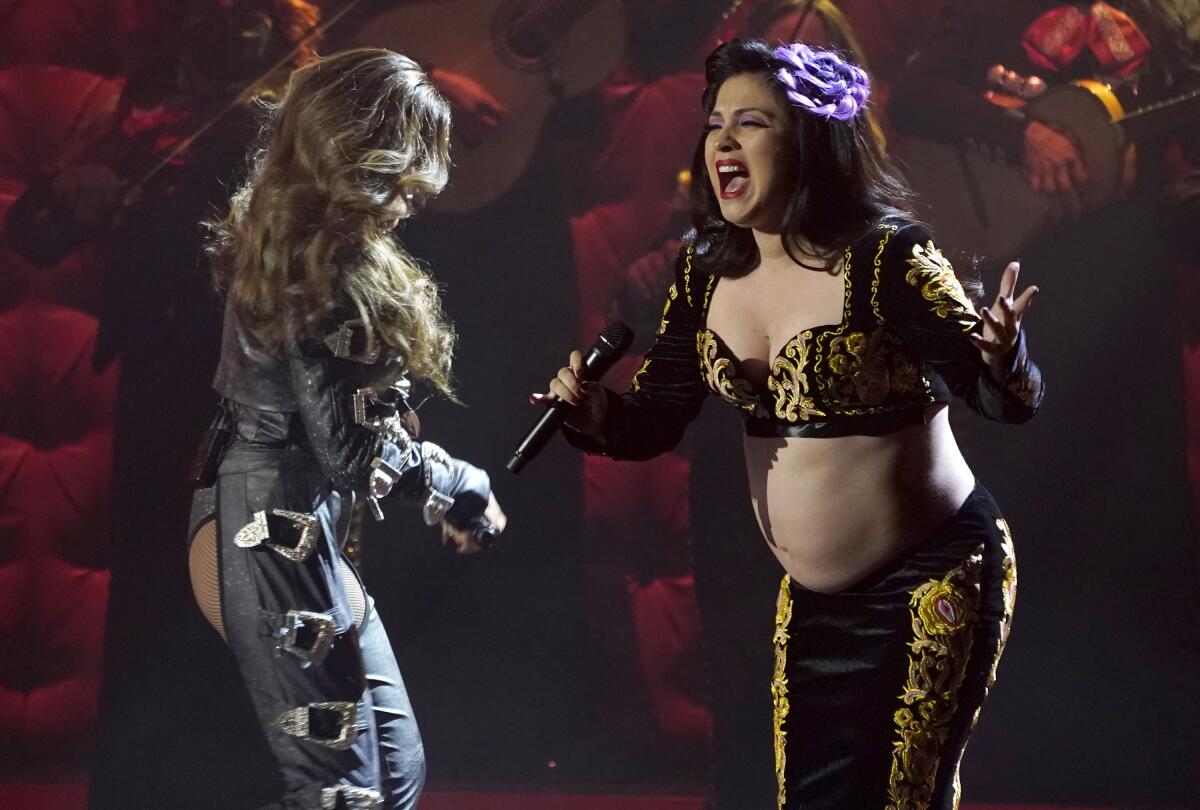
Women’s empowerment was a recurring motif this year. Spanish pop singer and “Élite” actor Danna Paola delivered a fierce rendition of her fight song “Calla Tú” (Shut Up, You), as the anti-domestic violence slogan “Ni Una Más” (Not One Less) flickered on the screen behind her. Mon Laferte, the Chilean alt diva who has taken the regional Mexican world by storm, became the third woman to win the Grammy for singer-songwriter album, for her 2021 LP “Seis.” Showing off a very pregnant belly in a cropped mariachi suit — embroidered with subtle vulva and uterus designs — Laferte performed her work of feminist noir “La Mujer” alongside Mexican pop provocateur Gloria Trevi.
Laferte wasn’t the only prospective parent to make the news Thursday night. Pop flower-child Camilo pranced barefoot across the stage before he claimed his Latin Grammy wins for Indigo Echeverry, his soon-to-be daughter with his wife, Latin Grammy-nominated singer-songwriter Evaluna Montaner.
Tangana, who reached across the Atlantic to collaborate with an array of Latin American artists for his 2021 album “El Madrileño,” teamed up with Omar Apollo, Nathy Peluso and Natalia Lafourcade for an intimate live performance of his flamenco song “Ingobernable.”
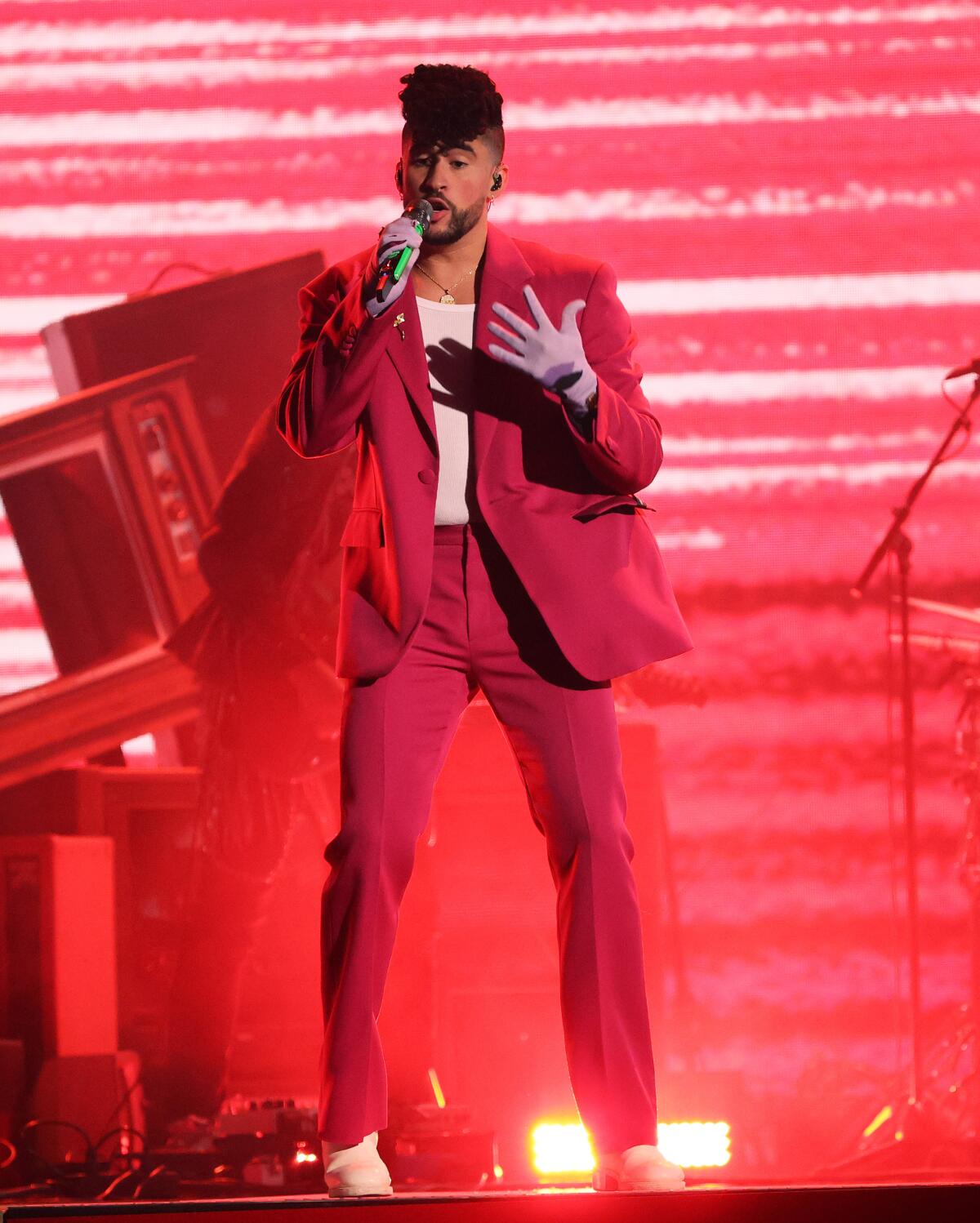
Bad Bunny, the Puerto Rican eccentric who had previously shown up to the Latin Grammys in board shorts and Crocs, stepped it up this year in a raspberry suit, lavender gloves and a curly mohawk. He won Grammys for urban album and rap/hip-hop song, and unleashed his inner punk with a fiery closing performance of the class-conscious ska track “Maldita Pobreza” off his rock-leaning LP “El Último Tour del Mundo.”
But it was 73-year-old Panamanian salsa icon and longtime social activist Rubén Blades who might have enjoyed the biggest night of any artist, winning album of the year for “Salswing!”, his latest project with Roberto Delgado & Orquesta, and being named the academy’s person of the year.
Covering the issues, politics, culture and lifestyle of the Latino community in Los Angeles, California and beyond.
The Fania All-Star, poet, actor and Harvard law graduate received death threats for challenging imperialism and racism in darkly funny salsa hits like “Plástico” and “Tiburón.” In 1994, Blades made a bid for president in his home country in the grim aftermath of Manuel Noriega’s military regime; he eventually became Panama’s minister of tourism. (Twenty years later, Americans came to know Blades as one of the main characters in the zombie drama “Fear the Walking Dead.”)
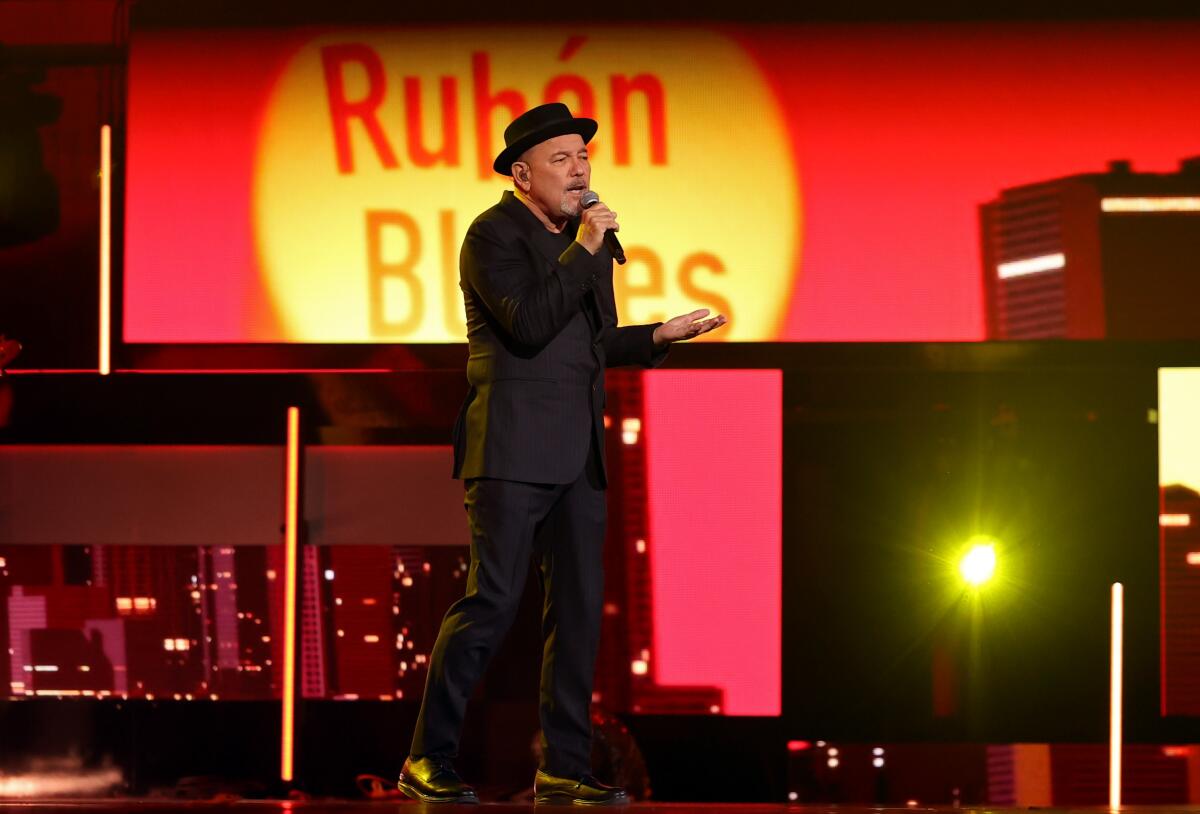
Puerto Rican rapper Residente could not help but shake when presenting Blades with the person of the year honor. “You are my mentor, my friend and like a father to me,” said Residente.
“Success tastes like pain, sweat and hope,” said Blades at the pre-ceremony person of the year gala. “Many times it tastes like s—. Fame is a place to be visited. It is not an address. Whoever does not understand it will suffer and lose his life.
“I am not afraid of time,” continued Blades. “Only of indifference.”
More to Read
The biggest entertainment stories
Get our big stories about Hollywood, film, television, music, arts, culture and more right in your inbox as soon as they publish.
You may occasionally receive promotional content from the Los Angeles Times.













